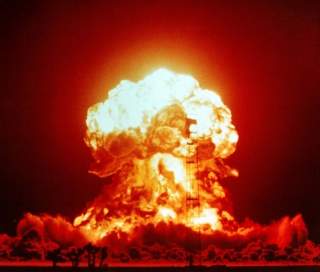Israel's Job Number One: Avoiding A Second Auschwitz
A second Holocaust would use WMDs - and Israel must be prepared to defend itself.
For yields in the low-kiloton range, this cloud would remain situated in the lower atmosphere. Its effects would be almost entirely "local.” For those yields exceeding thirty kilotons, parts of the cloud of radioactive debris could punch into the stratosphere, impacting the launching state and noncombatant states together.
Assuredly, to prevent a regional nuclear war, especially as Iran continues to approach full and expectedly irreversible membership in the “nuclear club,” Israel will require a reliable nuclear deterrent. At the same time, it cannot properly rely exclusively upon this one necessary basis of national security any more than it can depend solely upon conventional deterrence. It must depend, instead, upon increasingly complementary nuclear/conventional forces and doctrine, appropriately intersecting systems of anti-missile defenses, and the residual availability of certain eleventh-hour preemption options.
Even now, when the expected costs of any preemption against Iran could be astoundingly high, Israel should not disavow absolutely all last-resort options for "anticipatory self-defense." This is because, by definition, there might still be some readily recognizable consequences of not-preempting that are expectedly greater than all foreseeable risks of a preemption.
In life, some very serious games are not entirely volitional. In the Middle East, for example, strategic deterrence is a game that sane national leaders will simply have to play. In Jerusalem, this means, inter alia, a continuing willingness to fully respect doctrinal complexity - that is, both its own military doctrines, and those of its enemies—and then to forge ahead with appropriate and reciprocally complex defense policies.
"We are often asked," said the late Italian Jewish writer and Shoah survivor, Primo Levi, "as if our past conferred a prophetic ability upon us, whether Auschwitz will return.” As we have just seen, however, a return of Auschwitz need not take the precisely same form as the original Nazi kingdom of death. Soon, especially if Israel should somehow fail to maintain its essential deterrence posture, certain of Israel's enemies could begin to contemplate effectively genocidal attacks upon the Jewish State.
It follows, from all this, that Israel's nuclear strategy could ultimately represent nothing less than the final Jewish bulwark against another Auschwitz.

